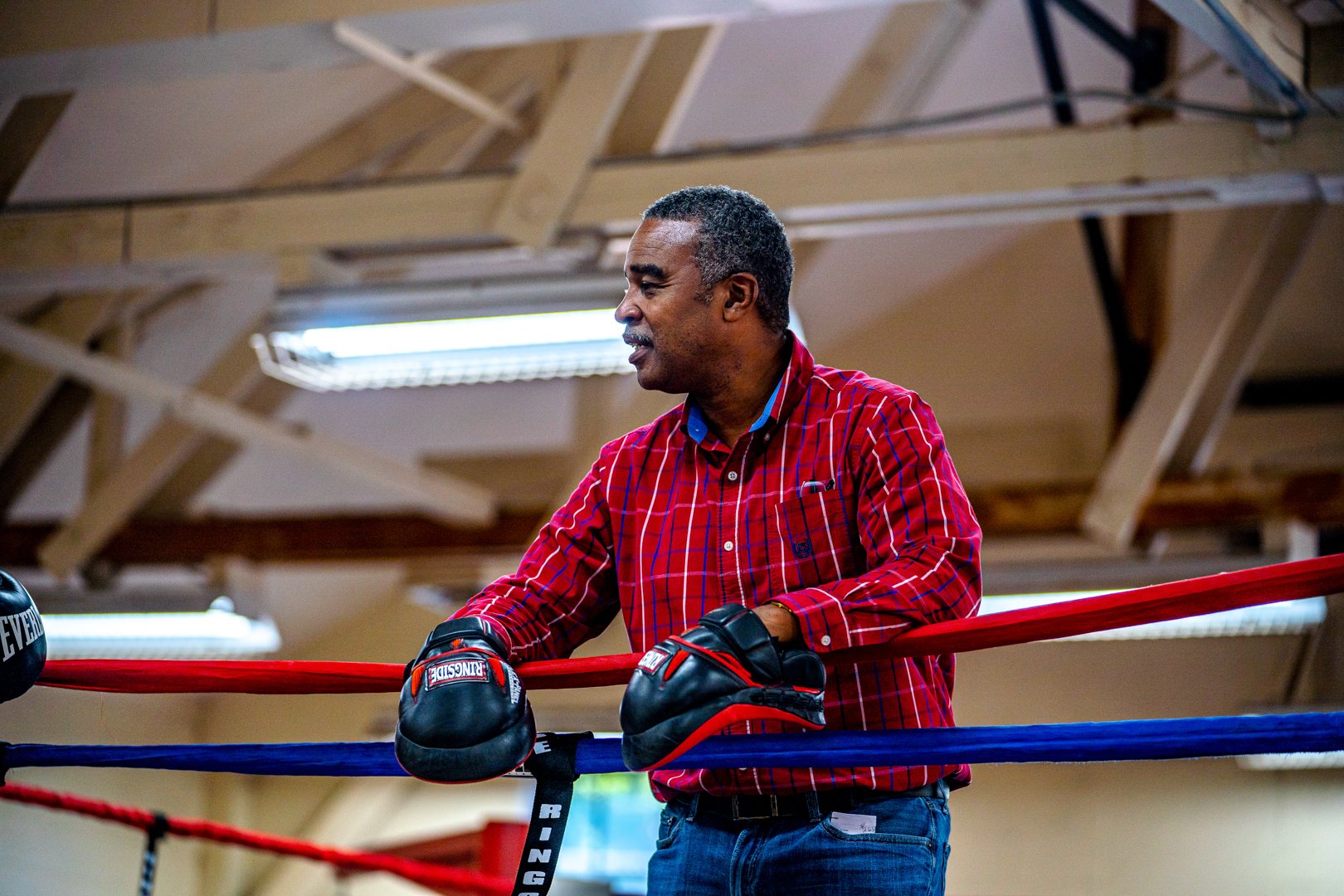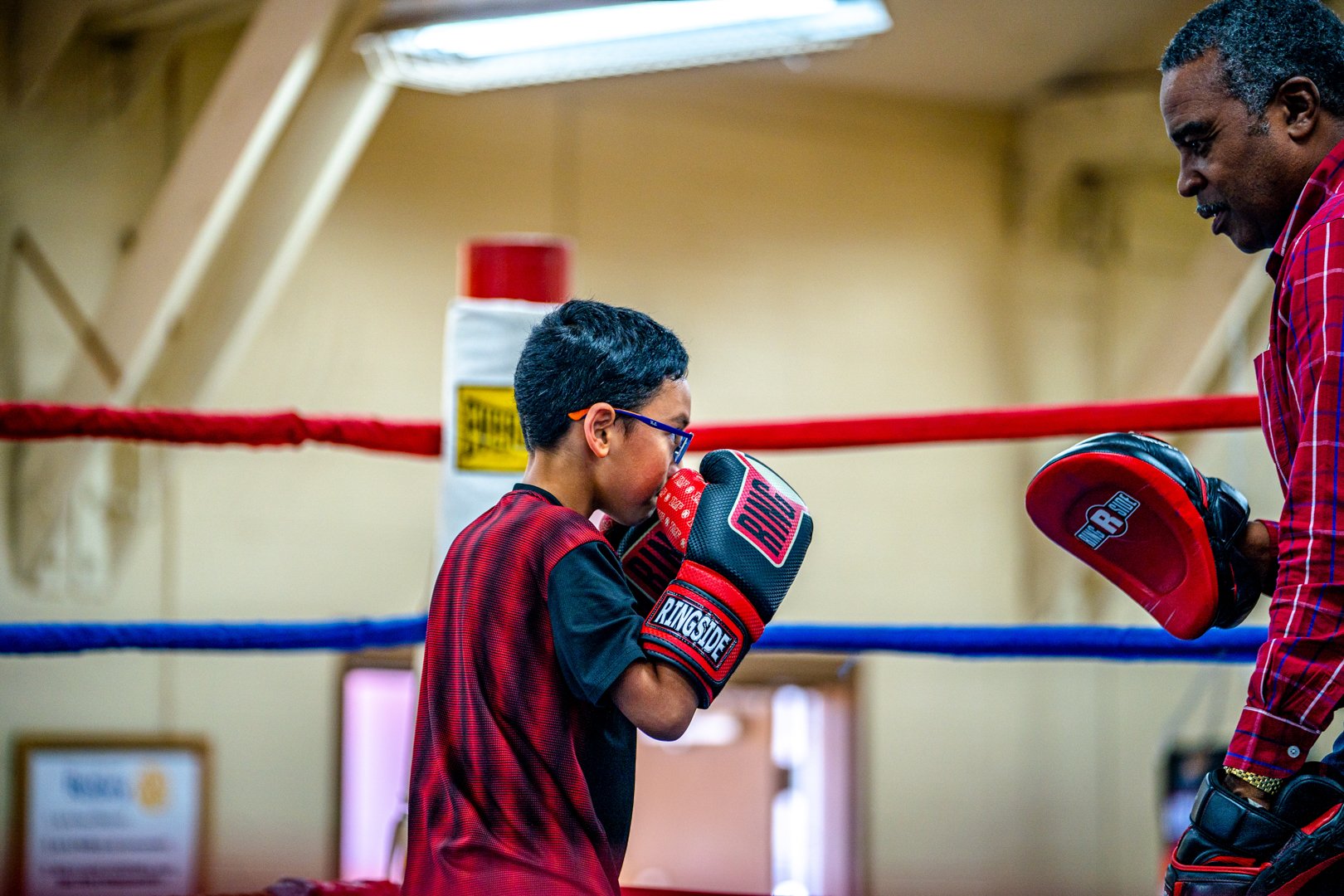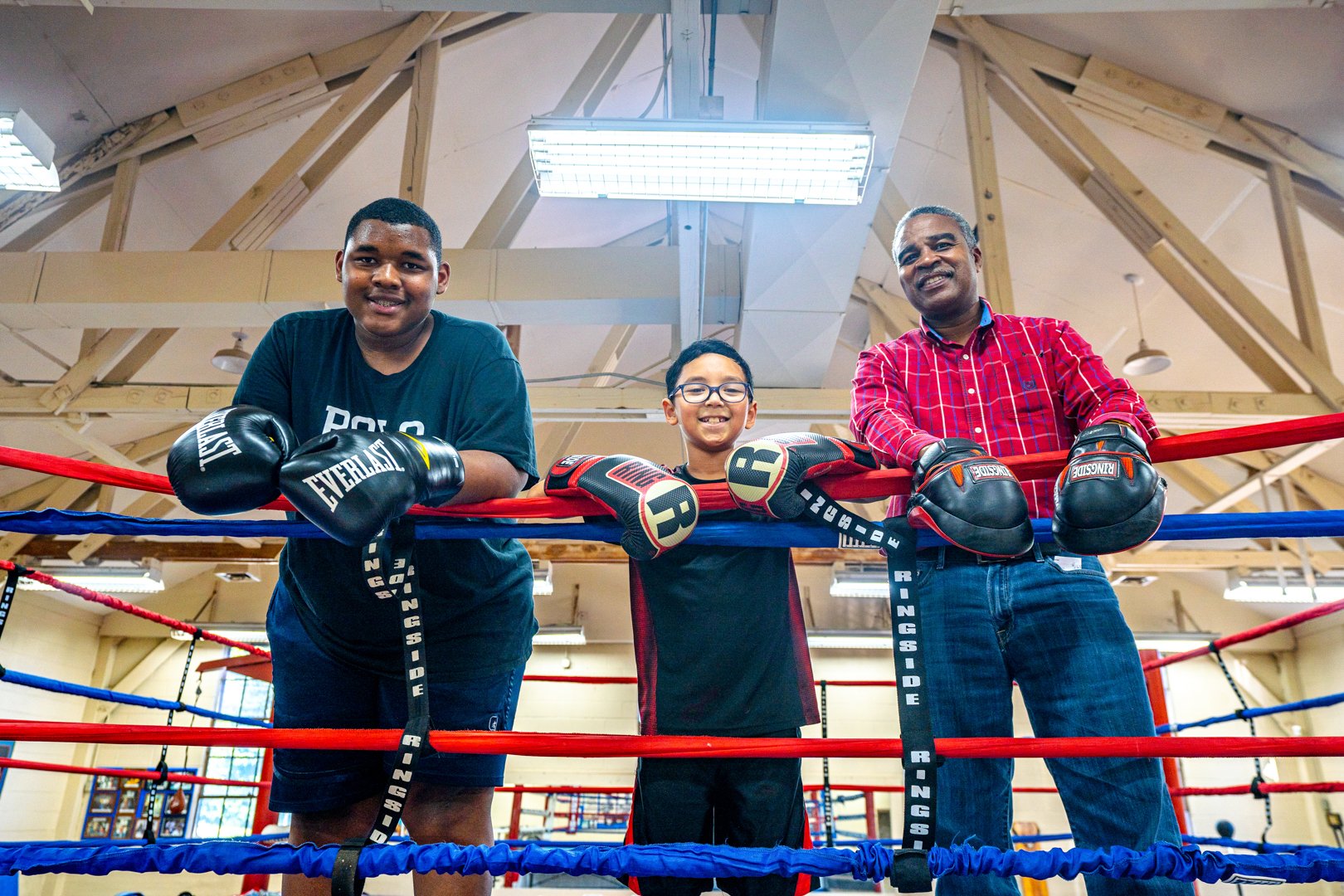Around the Ring & Back Again
BY GABE HART
PHOTOS BY DAN BATTLE
Featured in Vol 8, Issue 2: Philanthropy
“Float like a butterfly, sting like a bee.”
Muhammed Ali made that phrase famous. In many ways, Ali changed the national perception of boxing by adding fluidity, grace, and artistry to a sport that had long been dominated by fighters who relied on heavy-handed brute force. That famous quote is longer than those eight words, however. There’s a second part that has fallen away over time.
“The hands can’t hit what the eyes can’t see.”
Ali knew there was much more to boxing than the relentless barrage of punches being hurled toward an opponent. Boxing requires thought and strategy and, yes, savage violence as well.
Boxing has always been a sport fraught with brutality; a sport whose popularity has greatly waned over the last quarter century even as more brutal forms of combat have risen in popular culture. From UFC to MMA, violent combat sports have forced boxing to the precipice of irrelevance – like a slow, heavyweight fighter gasping for air against the ropes.
Before the rise in the appetite of violence by the general public, boxing found itself at the pinnacle of the sports world in America. Like other professional sports, boxing combined strength, athleticism, and skill, but did so with much higher stakes.
In basketball, if a player makes physical contact with too much force, that player is penalized. In football, players wear armor to protect themselves and limit the damage to their bodies. In baseball, the vast majority of contact is between the ball and the bat. Boxing, however, is a siloed sport. It is a violent act played out between two people in a ring with their only protection being their skill and their resolve.
Beneath the chaotic surface of what occurs in a boxing ring is what truly makes the sport beautiful. Boxing at its core is a harmonious and conflicting dance where every muscle in the body is acting in a rhythmic, graceful symphony in order to deliver a viciously devastating blow to an opponent. The legs and feet of a boxer are just as important as their hands. The legs are the accumulators in the body, where energy is stored until the fighter is ready to give the burst of torque to the upper body to deliver the strongest punch possible. The feet are light and delicate as they shuffle in a counted, metered way – up and back, left and right. A boxer’s hands are always curtained in front of the face to provide instant protection. There is a constant ebb and flow between intense violence and balletic grace.
“Every weekend, we’d go to towns around Jackson to box, stretch it out to Memphis, to Nashville, and go to so many places. I was so wrapped up in boxing that I didn’t have time to get in trouble,” he recalled. “Boxing kept me locked down in the gym and traveling. This stuff took me all over the world.”
OBIE BEARD
Decades ago, Jackson was home to some of the best fighters in the country. Under the tutelage of Coach Rayford Collins these young men would train in Jackson and fight all over West Tennessee and beyond. Names like Jim Carmichael, Joe Morris, Michael Nunnaly, and the Beard brothers (Jackie, Obie, Rickey, and Aubrey) all trained at Collins’s gym and were part of the legendary Jackson Boxing Club.
In the original incarnation of the JBC, Coach Collins passed his love of the sport of boxing to any young man who had the desire (and toughness) to learn the lessons that the sport of boxing provided. Collins would train these young men at his gym and then take them to tournaments around the region. While winning was paramount, the camaraderie and opportunities for travel outside of Madison County and West Tennessee that were provided by being part of the JBC were where the memories and lessons of that time were ingrained in the young men who were lucky enough to be part of it.
Obie Beard was a member of that group and found a love for boxing as a teenager.
“Every weekend, we’d go to towns around Jackson to box, stretch it out to Memphis, to Nashville, and go to so many places. I was so wrapped up in boxing that I didn’t have time to get in trouble,” he recalled. “Boxing kept me locked down in the gym and traveling. This stuff took me all over the world.”
As Obie’s and his teammates’ love for the sport grew, their talent and skill in the ring also began to rise. The more they trained, the more breath they had in their lungs after three rounds of fighting. The more reps on the heavy bag they accrued, the stronger their punches landed on their opponents’ rib cages. The more they sparred with each other in the ring, the more intense those sessions became.
“Boxing is a sport where my teammates helped get me in shape. In that ring right there,” he said with a wave behind his head, “we had better fights in our training than we did in actual fights.”
Even for people in the boxing world that had been around the sport their entire lives, the intensity of the practice sessions between teammates at the JBC was somewhat surprising. Obie recalled a time in Detroit when he and his brother were training in a gym for an upcoming fight and the gym’s trainer mistakenly thought a real fight had broken out during the sparring session.
“I was in Detroit, Michigan with one of the best trainers in the world. My brother and I were at this trainer’s gym sparring one day, and that man came running out of his office hollerin at us; he thought we were in a real fight. But I was taught that if you wanna be like Muhammad Ali, you gotta train like Muhammad Ali,” he said.
Ali was the gold standard for aspiring fighters in the 1960’s and 70’s. In many ways, it was boxing’s golden age in the world of sports, and Ali was the king. For Obie and his teammates to be like Ali they had to train like Ali. Through that training and experience fighting, the sport of boxing opened many doors for Obie.
“I was fortunate enough that when I graduated, the coach of the 1976 Olympic boxing team, Pat Nappi, got me a scholarship at Lane College. Boxing opened that door for me. When I left Lane, I didn’t owe them a dime,” he remembered.
Boxing gave Obie a free education and helped teach him those hard lessons that helped shape him and his teammates, but those hard lessons didn’t seem as appealing for everyone. Boxing was a sport that was dangerous and challenging.
“In order to learn boxing, you’re gonna have to get whooped. That’s where you learn,” Obie explained.
But Obie learned a lot more than when to slip a left jab or duck a right hook. Through countless punches to the face and the body, through the exhaustion of the constant movement, to his hands feeling like bricks, Obie still remembers the lessons that were literally knocked into him in the ring in East Jackson.
“I used to get beat up everyday in that ring, but iron sharpens iron. I learned more from getting hit in a ring than I did when I was doing the hitting,” he said. “Just because something bad happens or you get hit in the face, doesn’t mean you just have to go off the chain. You have to keep your composure in the ring; you have to be considerate of people no matter how mad you are at them outside of the ring. Some people don’t have self-control, but boxing helps teach self-control.”
As the overall popularity of boxing began to recede, less young men came to the JBC on a regular basis. Long after Obie and his teammates moved on from the JBC, Coach Collins continued to train new boxers but not the same number of boxers or with the same consistency. As Rayford Collins aged and interest in the sport dwindled, a decision needed to be made about the future of the Jackson Boxing Club.
There are circular patterns of completion and restoration throughout the physical world — endings of stories finding themselves in some of the familiar places they began; seasons rotating like hands on a clock with the same rhythm as a boxer’s feet - up and back, left and right.
Muhammed Ali came full circle: loved as a young fighter, hated for his courageous political stances, and in the end, revered as one of the most influential athletes in our nation. Like his hero, Obie Beard had a circular moment in his life, too.
In 2015, Rayford Collins, in declining health, passed the mantle of Head Coach of the Jackson Boxing Club to Obie Beard. That same year, Coach Collins was given the first Lifetime Achievement Award from The Jackson-Madison County Sports Hall of Fame.
In 2016, Obie Beard was inducted into the Lane College Hall of Fame and later that year, Rayford Collins, the man who sparked Obie’s love for boxing, passed away at age 76. Obie was left with the memories and lessons he learned from Rayford, but also with the heavy responsibility of continuing a legacy that impacted so many young people in Jackson.
Every two minutes, a shrill, automated sound emanates from a box with red, yellow, and green lights alternating flashes. The box rests on a table next to the ring, across the room from where Obie and I are sitting. The box is an interval timer used for training fighters in timed rounds. Behind me, a young man is throwing heavy hooks into a weighted bag that hangs from the ceiling at the JBC which is now located just off North Royal on O’Neal Street. The sound of the gloves hitting the bag and a metallic chain rattling as it shook is familiar to Obie. He glances at the young man from time to time as we talk making sure his form is correct, that he’s throwing his punches with his whole body and not just his arms.
“A lot of times, how you stand as a boxer affects how hard your punches are thrown,” he tells me. “We were taught to punch with our legs; you tryin' to go through and knock your opponent’s head off. It’s a wonderful sport,” he says with a smile.
There are pictures hanging in the gym of Obie’s former teammates. The pictures are in a straight line, high and near the ceiling, as if they’re observing what is taking place in the gym below them. Obie feels their presence, and Rayford’s presence, too.
“I think about our time with Rayford Collins and it’s a lot like Jackson — you don’t really know what you have here until it’s gone,” he reflected. “Some people think boxing is about making money, but that’s not what it is for me; it’s the opposite. I owe this town and this sport; I’m in debt to it. I’m paying that back now. I want to pay that back.”
Most debts are burdensome and heavy, but this payment is a payment of love. It’s an involuntary sacrifice for Obie.
I owe this town and this sport; I’m in debt to it. I’m paying that back now. I want to pay that back.
OBIE BEARD
“Boxing taught me how to treat people; it taught me humility and self-control. I’m trying to make the world better and not worse.”
Obie and the JBC are facing the same challenges that a lot of sports and clubs and even schools are facing when it comes to engaging kids in the year 2022 — a competition for their interests and trying to regain some normalcy since the pandemic. Obie says his numbers are sparse and attendance is inconsistent, but he thinks the best days for the JBC are ahead. He also knows that the main goal of the JBC isn’t winning tournaments, but giving kids a healthy outlet for exercise and fun.
“We don’t have a lot coming regularly right now. Some kids will come in when we open the doors up and some won’t,” he explained. “This sport can attract a lot of kids who are doing stuff they don’t need to be doing, but that’s a good thing because boxing is a great sport that gives guidance.”
With a partnership with the Jackson Police Department and burgeoning cooperation from community advocates, the JBC is building a support system for young people to reap the same kinds of benefits that Obie and his teammates received over thirty years ago.
“Even if we’re not quite boxing in tournaments, yet, I’ll take some of the kids who come here and we’ll go watch a fight in Paris, Tennessee or in Brownsville. I want them to see what it’s like and what they’re getting into,” he said. “If we don’t find kids something to do to keep them out of trouble, they’re gonna find something to do that might get them in trouble.”
The overlapping lessons learned in the ring that are applicable to life are numerous and somewhat cliche, but those lessons are also true. The boxing ring is still the great equalizer, and if the sport is taught and learned correctly, it can be a place where brotherhood and sisterhood can truly be formed. Boxing is like a chess match with your fists — it takes thought, controlled impulsivity, strength, and grace. It is hard and taxing and extremely rewarding.
“I know what it’s like to be a kid that needs something and have someone step in and help me out. I want to be that for kids in Jackson”
OBIE BEARD
Obie is proof of all that boxing can provide a young person who wants to put in the work it takes to learn those lessons inside a ring. He wants to pay his debt back to Jackson; to help kids today learn what he learned so many years ago.
“I think this club could bring us together as a people. In that ring, it doesn’t matter what color you are. You’re teammates, you’re fighting to make each other better. I know what it’s like to be a kid that needs something and have someone step in and help me out. I want to be that for kids in Jackson.”
GABE HART is the Chief Communications Officer for Haywood County Schools. A lifelong Jacksonian, Gabe is a product of the Jackson-Madison County School System and taught English in JMCSS for fourteen years. Along with contributing to Our Jackson Home, Gabe also writes monthly columns for Tennessee Lookout and The Jackson Sun and has been published in The Tennessean. He lives in Midtown Jackson with his daughter who attends high school at Madison Academic. When he's not in Jackson, he's most likely traveling with his partner, Laura, or spending time with her in her hometown of Philadelphia.
DAN BATTLE is a self taught photographer and filmmaker. He has the artistic ability to display beauty in unexpected places.








